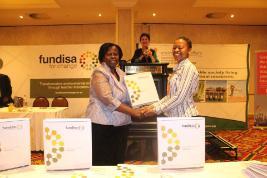
The Fundisa for Change Teacher Education Professional Learning Community, Materials and Programme was successfully launched at the first Fundisa for Change conference. The conference was opened by the Director General of Environmental Affairs, Ms Nosipho Ngcaba on 27th February, with the Deputy Minister of Water and Environmental Affairs Ms Rejoice Mabudafasi launching the programme and materials on the morning of the 28th of February.
Fundisa for Change is a collaborative programme formed specifically to enhance transformative environmental learning through teacher education. The programme was formed in 2011 as a partnership programme or national Professional Learning Community (PLC) involving South Africa’s teacher educaiton institutions working with many of South Africa’s major education and environmental organisations, including state, parastatal, NGO, development and private sector partners who have an interest in teacher education for sustainable development.
The aim of the conference was to build and strengthen a national system of engagement for transformative environmental learning and education for sustainable development through teacher education.
There were more than 250 delegates in total throughout the two days. Delegates were from state governments (DEA, DWA, DBE, DST etc), parastatals (SANBI, SAnparks), organisations from the environmental sector (WESSA, Delta, Rand water, SAEON, etc.), teacher educators frominstitutions of higher education (UNISA, UFS, UniZulu, WSU, NWU, RU, UFH, UCT, Wits, etc.), development and private sector partners (Murray and Roberts, GreenMatter, SWEDESD, USAID etc.).
Speaking at the launch, Mabudafhasi said, “Hosting this conference is the first remarkable and tangible step towards implementation which follows many years of policy development. Our positive outlook emanates from the realisation that environmental education, which we tirelessly advocated for over the years, is finally taking the centre stage”.
“There is need for a strong national partnership to make environmental content knowledge available to the education and training system to fast-track the inclusion of new environmental content knowledge into the national system of education and training”, said Mabudafhasi, in keeping with the aim of the conference.
Two types of teacher education materials have been developed (through funding from Murray and Roberts and the Lewis Foundation) and were launched at the conference, a) three generic ‘core’ materials to contribute to quality education and b) eight subject-specific materials to support teaching specific curriculum topics relevant to specific phases of the schooling system. The general core materials and two of the subject specific materials have been piloted across the country with teachers and subject advisors (through GIZ funding).
Fundisa for Change is now poised to move to scale and wants to extend its reach to all the provinces. The programme aims to obtain endorsement of the Fundisa for Change materials and programme from the South African Council of Educators (SACE) to align with new policy developments in which teachers will obtain professional development points for completing continuing professional development programmes.
Some key points from presentation on day one of the conferences were: a) Teacher education is a key ESD priority internationally, b) systems thinking is a key for learning to change, c) environmental knowledge and practices of local communities can make a significant contribution to environmental sustainability education, d) Teachers are pivotal to the level of success our learners are able to achieve.
Workshop recommendations made on the second day of the conference included suggestions that: a) Fundisa needs to link its activities to HEI networks to ensure inclusion in programmes for teacher education. It would be useful to link with official structures such as the CHE to ensure wider currency for Fundisa ideas, b) more support should be given to subject advisors as they are first and foremost working closely with teachers, c) The use of CAPS should be the starting point, teachers need workshops for understanding content – this will facilitate the following: use of textbooks not as the only source – (we need to support teachers to think and work critically with different sources within the CAPS).
Going forward, the programme aims to continue offering teacher training and training of trainers programmes for teacher education partners and partners in the environmental sector wishing to implement the Fundisa for Change programme and materials. Additionally a national textbook for teacher education will be developed to ensure ‘critical mass’ and longer term sustainability of the programme.
A multi-institutional Fundisa for Change research programme funded by NRF is currently underway, with 10 Masters scholars and 3 PhDs engaged in Fundisa for Change research. With funded support from Murray & Roberts (who have supported the development of the Fundisa for Change teacher education materials) a seminar series will also be launched, to take place in 10 national teacher education institutions this year, to introduce the programme and materials to all staff members in these institutions. The Chief Director of Teacher Professional Development in the Department of Basic Education, Mr Haroon Mohammed praised the Fundisa for Change programme for being one of South Africa’s most well organized Professional Learning Communities, an enviable reputation that the Fundisa for Change partners hope to carry from strength to strength in future!
For more information click http://fundisaforchange.co.za/
